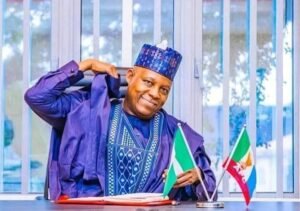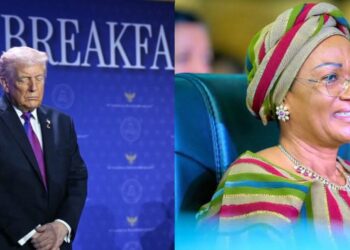THE MERIT NEWSPAPER EDITORIAL Shettima, Semantics, and the Sanctity of Grammar in National Discourse

In the heat of Nigeria’s ever-volatile political commentary, grammar is often the first casualty. Once again, the nation finds itself embroiled in a needless storm — not of governance or constitutionality — but of semantics. The recent comment by Vice President Kashim Shettima, stating that “You do not have the powers to remove a sitting governor, not even a councillor,” has triggered backlash among some Nigerians who appear more interested in dramatising his words than understanding them.
Let us be clear: there is a fundamental difference between the words “removal” and “suspension.” These are not synonymous terms and cannot — should not — be used interchangeably. While removal signifies a permanent ousting from office, suspension denotes a temporary halt, often pending further inquiry or resolution. The Vice President’s use of “remove” was deliberate, contextually precise, and constitutionally rooted.
It is troubling that in a country as intellectually diverse as Nigeria, such a vital distinction in language is being obscured by political misinterpretation and internet punditry. The Vice President has not contradicted his principal, President Bola Ahmed Tinubu. On the contrary, he has echoed the foundational understanding of constitutional democracy: that a president, no matter how powerful, has no authority to unilaterally remove an elected governor.
President Tinubu’s action, it must be reiterated, was a suspension, not a removal — a move that falls within a different legal and political bracket altogether. Shettima’s statement did not challenge that action; rather, it clarified what the law upholds and what democracy demands.
But this moment has revealed more than just a misreading of Shettima. It has exposed a widespread grammatical indifference that continues to plague national discourse. It is high time Nigerians learned to distinguish between synonyms and non-synonyms. This isn’t pedantry; it’s precision. In matters of law, governance, and leadership, words are tools — not toys. The misuse of vocabulary can lead to dangerous assumptions, misplaced criticism, and public disillusionment.
READ ALSO:THE MERIT NEWSPAPER – EDITORIAL Peter Obi and the Politics of Performance
Recall a similar moment on the international scene: during a meeting, U.S. President Donald Trump expressed surprise at the Liberian President’s fluency in English, reportedly asking where he was educated. It was a revealing remark — and while some laughed, it underscored the global expectation that leaders should articulate ideas with clarity and command of language. The Liberian President, Joseph Boakai, impressed not merely because he spoke English, but because he did so with accuracy. “Thank you, and such good English… Where did you learn to speak so beautifully? Where were you educated?” Trump said.
Vice President Shettima did exactly that.
At The Merit Newspaper, we urge Nigerians to rise above the politics of misinterpretation and embrace the discipline of language. Leadership is not merely about charisma or policy; it is also about communicating with clarity. In this case, Shettima did just that. He deserves understanding, not condemnation.
READ ALSO:“High Time” or High Mistake? The Grammar Rule Even Professionals Ignore
If we are to build a nation where democracy thrives, let us begin by understanding the very words that shape our political conversations.
– The Editorial Board,
The Merit Newspaper

















